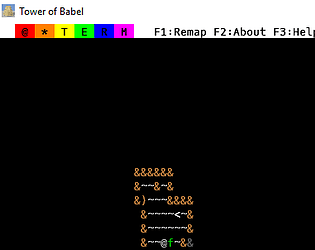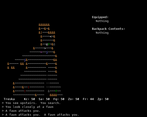Play game
Tower of Babel's itch.io pageResults
| Criteria | Rank | Score* | Raw Score |
| Roguelikeness | #1 | 4.000 | 4.000 |
| Innovation | #4 | 3.667 | 3.667 |
| Fun | #11 | 3.333 | 3.333 |
| Completeness | #11 | 3.667 | 3.667 |
| Overall | #11 | 3.500 | 3.500 |
| Scope | #26 | 3.000 | 3.000 |
| Aesthetics | #30 | 3.333 | 3.333 |
Ranked from 3 ratings. Score is adjusted from raw score by the median number of ratings per game in the jam.
Judge feedback
Judge feedback is anonymous and shown in a random order.
This game is hilarious.
The current controls have a very Vi keys bias, I was able to get used to it with a custom movement layout but it would have been nice to have been able to use the keypad. I would have liked to have the ability to alias the keypad keys to the letter keys at least, or maybe also include the numbers row.
Tower of Babel is a very slickly-done roguelike in a very traditional sense: @ symbol working through mostly square rooms connected by hallways (some exceptions) bump-attacking into ascii-character monsters with various stats while picking up gear of various random types and effects. The main twist is that you are "connecting" to a radically different alternate world version of such a roguelike every time you play. The most obvious way this manifests is that every action is mapped to a new key. This dictates that the first 100 turns or so of each playthrough are spent fumbling back and forth as you try each key, either making notes about what key does what, or re-mapping them, or both. Initially, I found this a nice balance of charming and frustrating. It took me my fifth playthrough to actually just map the movement keys without getting mauled by passing enemies or pressing the Commit Suicide button the game sadistically includes.
Once I got that run on its feet I had a very fun experience with many classic roguelike moments. I got a lucky early drop of a powerful spell rune. I cheered at the discovery of a good weapon. I decided in a panic to flee from a room with a dozen monsters, sprinting for the stairs. And I blessed my luck as I discovered a wandering elephant moments before starving, throwing my last acid vial at it and eating its corpse. I even died (on level 5 of 7) in a classically avoidable roguelike way, misreading one enemy for another, panicking, and then casting a healing spell that, because I was low on mana, drained my health below 0 before it could bring me back to full.
So my takeaway is that the roguelike bones under this are, while very traditional, extremely solid. And to be clear, the author has made several novel tweaks to the rogue formula (particularly with inventory management) that are clever accommodations of the every-key-is-random mechanic. However, my final thought is that the initial experience of mapping the keys from scratch isn’t particularly fun after you’ve succeeded at it once. After my death on level 5, I was eager to try again, to explore more of the dungeon…but despaired at going through the awkward key-mapping again. The author allows that you can turn this part off in the .cfg file…but that feels like betraying the game. My (very speculative) suggestion would be, what if there were more than 26 commands available in the game, and what if on spawning, you not only randomized which key did what, but also which 26 of the 36 possible actions your character was armed with this time? That would make the initial discovery period not just an exercise in key-mapping, but a discovery about what kind of "load out" your character had this time...
Completeness:
Seems like complete game. I didn't play much, to be honest (more about it in "fun" section), but I didn't find any major bugs. Game freezes for some time after calling F-commands (at first call, usually).
Aesthetics:
Classic, but very clean graphics, pleasant font, nice use of text scrolling. Immersive UI.
Fun:
It's really hard to judge. The very point of Tower of Babel is "obfuscation". Everything is randomized, even controls. While "remapping" keys is nice concept, I don't think it's implemented well. There is lots of keys, including one for suicide attempt. If player will spawn in room with others enemies, it's hard to survive long enough to learn how to move and defend self. And even later, when key controls are remapped to sane scheme, I didn't have much imperative to play - I was just tired, because remapping was a fight, a hard one.
In general, I can't tell that Tower of Babel is fun game to play. But interesting one? Yes, definitely.
Darren Gray wrote that [playing ToB] feels like to be a non roguelike player encountering roguelikes. I can't agree - it's much tougher experience ;)
Innovation:
As usualy, Jeff Lait makes something new. I don't know any other game that uses random generation at that scale. Here, everything is alien: stats (what Ky means?!), keyboard controls, monsters...
Scope:
It's simple and relatively small game, but it has lots of variety. I played ToB 6 times, and every time, another dungeon generator was in use.
Roguelikeness:
Yup yup yup.
Successful or Incomplete?
Leave a comment
Log in with itch.io to leave a comment.





Comments
No one has posted a comment yet